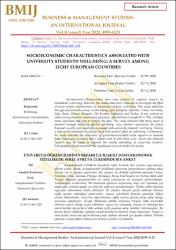Socioeconomic characteristics associated with university students' well-being: A survey among eight European countries

Göster/
Erişim
info:eu-repo/semantics/openAccesshttp://creativecommons.org/licenses/by‐nc‐nd/3.0/us/Tarih
2020Üst veri
Tüm öğe kaydını gösterÖzet
Socioeconomic characteristics have some positive or negative impacts on
individuals' well-being. However, few studies have been conducted to investigate the effect
of socioeconomic characteristics on university students' well-being. This study addresses
this gap and presents survey results among eight European countries: France, Germany,
Italy, Spain, Poland, Romania, The Russian Federation and Turkey. It was utilized an
online survey based on closed-ended questions, collected from a sample (N = 796). Multiple
linear regression was used to analyze the data. This study indicated that being aware of
personal strength positively affected well-being. Also, positive expectations for future
financial security were positively associated with university students' well-being. Having
a high social interaction in society has a little positive effect on well-being. Furthermore,
the study indicated the importance of government-provided social supports as students
from France and Germany had a higher level of well-being score. Social and financial
support may be useful to improve the overall well-being of university students.
Policymakers should reconsider the significance of social welfare for society. Sosyoekonomik özelliklerin bireylerin refahı üzerinde bazı olumlu veya olumsuz
etkileri vardır. Ancak, sosyoekonomik özelliklerin üniversite öğrencilerinin refahına etkisi
üzerine çok az çalışma yapılmıştır. Bu çalışma, bu eksikliği gidermek amacıyla Fransa,
Almanya, İtalya, İspanya, Polonya, Romanya, Rusya Federasyonu ve Türkiye dahil sekiz
Avrupa ülkesinde gerçekleştirilen bir anket çalışmasına ait sonuçları göstermektedir.
Araştırmanın örneklemini 796 üniversite öğrencisi oluşturmuş olup, veri toplamak için
kapalı uçlu sorulara dayalı çevrimiçi bir anketten yararlanılmıştır. Veriler çoklu doğrusal
regresyon kullanılarak analiz edilmiştir. Bu çalışma, bireysel gücün farkında olmanın
refahı olumlu etkilediğini göstermiştir. Ayrıca, gelecekteki finansal güvenliğe ilişkin
olumlu beklentilerin, üniversite öğrencilerinin refahı üzerine pozitif etkiye sahip olduğu
sonucuna ulaşılmıştır. Sosyal etkileşimin yüksek olmasının bireysel refah üzerindeki
etkisinin sınırlı olduğu tespit edilmiştir. Ayrıca bu çalışmada, Fransa ve Almanya’dan
ankete katılan öğrencilerin daha yüksek refah puanına sahip oldukları bulunmuştur. Bu
durum devlet tarafından sağlanan sosyal desteklerin önemini ortaya koymuştur. Sosyal ve
mali destek, üniversite öğrencilerinin genel refahını artırmak için faydalı olabilir. Politika
yapıcılar, sosyal refahın toplum için önemini yeniden ele almalıdır.


















